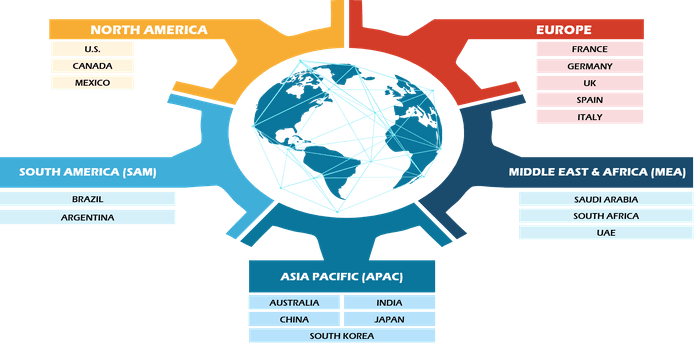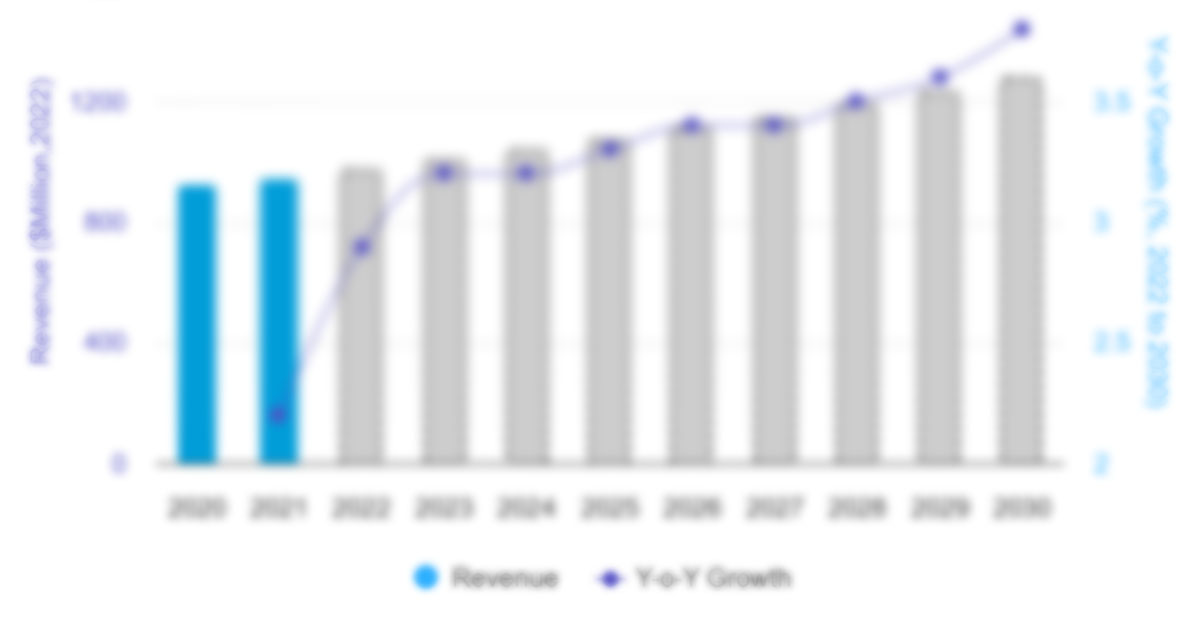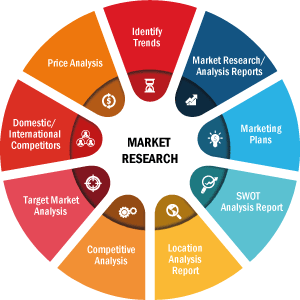The Artificial Pacemaker Market is expected to register a CAGR of 6.0% from 2025 to 2031, with a market size expanding from US$ XX million in 2024 to US$ XX Million by 2031.
The report presents an analysis based on type (screening biomarker, diagnosis biomarker). The report further provides analysis based onapplication (diagnostics, drug discovery, personalized medicine, others). The global analysis is further broken-down at regional level and major countries. The market size and forecast at global, regional, and country levels for all the key market segments are covered under the scope. The report offers the value in USD for the above analysis and segments. The report provides key statistics on the market status of the key market players and offers market trends and opportunities.
Purpose of the ReportThe report Artificial Pacemaker Market by The Insight Partners aims to describe the present landscape and future growth, top driving factors, challenges, and opportunities. This will provide insights to various business stakeholders, such as:
- Technology Providers/Manufacturers: To understand the evolving market dynamics and know the potential growth opportunities, enabling them to make informed strategic decisions.
- Investors: To conduct a comprehensive trend analysis regarding the market growth rate, market financial projections, and opportunities that exist across the value chain.
- Regulatory bodies: To regulate policies and police activities in the market with the aim of minimizing abuse, preserving investor trust and confidence, and upholding the integrity and stability of the market.
Artificial Pacemaker Market Segmentation
Type- Implantable
- External
- Biventricular
- Single-Chambered
- Dual-Chambered
- Arrhythmia
- Congestive Heart Failure
- Other
- Hospitals
- Ambulatory Surgical Center
- Others
Strategic Insights
Artificial Pacemaker Market Growth Drivers- Increasing Prevalence of Cardiovascular Diseases:The rising levels of cardiovascular diseases like arrhythmias and heart block are promoting the artificial pacemaker market since more interventions are required for these patients, thus positively affecting the growth of the market due to increased demand for pacemakers.
- Pacemaker Design and Technology Advancements:Latest innovation in pacemakers, such as leadless and MRI-compatible pacemakers, aims to produce better patient outcomes and comfort. Such innovative changes to the functionality of pacemakers make them more applicable, which directly fuels further expansion within the market when healthcare providers turn towards modern solutions to care for better patients.
- Awareness and Screening Initiatives:Increased awareness on heart health and deployment of screening programs are the reasons for having a large number of patients coming under the radar much earlier than in the past. The result is an increasingly large number of patients who require pacemakers, which will, in turn, fuel the growth of the market since healthcare systems become more and more willing to intervene sooner to salvage those patients.
- Rise of Remote Monitoring Technologies:Application of remote monitoring technologies in pacemakers will keep rising in the future. As this product monitors patients' heart rhythms in real-time, it increases patient management by reducing hospital visitations. Hence, it puts before the market an expected rise in growth with improved outcomes for the patient.
- Emphasis on Minimally Invasive Procedures:There is much hype in the use of minimally invasive procedures for pacemaker implantation. Techniques such as transvenous lead placement are gaining popularity because they reduce recovery times and complications, hence making the procedure more appealing both to patients and care givers.
- Development of Biocompatible Materials:There is a growing interest among the manufacturers to formulate biocompatible materials for pacemakers. Such materials reduce the chances of infection and the life of the device, hence following the global trend for safer and better medical equipment, which is the main requirement for patient acceptance and growth in a market.
- Collaboration with technology firms:It offers a great opportunity for collaboration with technology firms to develop advanced features such as the integration of AI and machine learning in pacemakers. Such partnerships might make manufacturers produce smarter devices designed to improve patient monitoring and predictive analytics capabilities, for instance, that distinguish them from the competition.
- Patient Education and Support:There are specific opportunities for a manufacturer due to investing in educational support programs for patients. Resource and training for patients as well as healthcare providers will contribute to higher device adoption and patient satisfaction, higher brand loyalty, and ultimately long-term success.
- Advanced Features and Commercial Potential: Next-generation pacemakers, with advancements including wireless charging and telemetry, will provide an opportunity to invest in research and development for manufacturers. They can use their ingenuity to develop innovative products that meet the changing needs of patients, thereby emerging at the forefront of the artificial pacemaker market.
Market Report Scope
Key Selling Points
- Comprehensive Coverage: The report comprehensively covers the analysis of products, services, types, and end users of the Artificial Pacemaker Market, providing a holistic landscape.
- Expert Analysis: The report is compiled based on the in-depth understanding of industry experts and analysts.
- Up-to-date Information: The report assures business relevance due to its coverage of recent information and data trends.
- Customization Options: This report can be customized to cater to specific client requirements and suit the business strategies aptly.
The research report on the Artificial Pacemaker Market can, therefore, help spearhead the trail of decoding and understanding the industry scenario and growth prospects. Although there can be a few valid concerns, the overall benefits of this report tend to outweigh the disadvantages.
REGIONAL FRAMEWORK
Have a question?

Mrinal
Mrinal will walk you through a 15-minute call to present the report’s content and answer all queries if you have any.
 Speak to Analyst
Speak to Analyst
- Sample PDF showcases the content structure and the nature of the information with qualitative and quantitative analysis.
- Request discounts available for Start-Ups & Universities
- Sample PDF showcases the content structure and the nature of the information with qualitative and quantitative analysis.
- Request discounts available for Start-Ups & Universities

Report Coverage
Revenue forecast, Company Analysis, Industry landscape, Growth factors, and Trends

Segment Covered
This text is related
to segments covered.

Regional Scope
North America, Europe, Asia Pacific, Middle East & Africa, South & Central America

Country Scope
This text is related
to country scope.
Frequently Asked Questions
The North America region accounts for highest revenue share distraction osteogenesis devices market
The final report will duly include market size and projection estimates for all the segments from 2021 to 2031, along with a revenue share and compound annual growth rate (%) for the regional/country-wise market wherein 2021-2022 are the historic years, 2023 is considered to be the base year, and the forecast will be provided till 2031, along with CAGR (%)
Acumed LLC, Jeil Medical Corporation, Johnson & Johnson, KLS Martin Group, Ningbo Cibei Medical Treatment Appliance Co Ltd, Ortho Max Manufacturing Company Pvt Ltd , OsteoMed, Stryker Corporation, Titamed are the some of the key market players operating in the distraction osteogenesis devices market.
Chronic disease prevalence and aging population is the major factors boosting the distraction osteogenesis devices market growth.
The market is expected to grow at a CAGR of 5.4%
Asia Pacific is estimated to grow at the highest CAGR over the forecast year (2023 - 2031)
1. INTRODUCTION
1.1. SCOPE OF THE STUDY
1.2. THE INSIGHT PARTNERS RESEARCH REPORT GUIDANCE
1.3. MARKET SEGMENTATION
1.3.1 Artificial Pacemaker Market - By Type
1.3.2 Artificial Pacemaker Market - By Technology
1.3.3 Artificial Pacemaker Market - By Application
1.3.4 Artificial Pacemaker Market - By End User
1.3.5 Artificial Pacemaker Market - By Region
1.3.5.1 By Country
2. KEY TAKEAWAYS
3. RESEARCH METHODOLOGY
4. ARTIFICIAL PACEMAKER MARKET LANDSCAPE
4.1. OVERVIEW
4.2. PEST ANALYSIS
4.2.1 North America - Pest Analysis
4.2.2 Europe - Pest Analysis
4.2.3 Asia-Pacific - Pest Analysis
4.2.4 Middle East and Africa - Pest Analysis
4.2.5 South and Central America - Pest Analysis
4.3. EXPERT OPINIONS
5. ARTIFICIAL PACEMAKER MARKET - KEY MARKET DYNAMICS
5.1. KEY MARKET DRIVERS
5.2. KEY MARKET RESTRAINTS
5.3. KEY MARKET OPPORTUNITIES
5.4. FUTURE TRENDS
5.5. IMPACT ANALYSIS OF DRIVERS AND RESTRAINTS
6. ARTIFICIAL PACEMAKER MARKET - GLOBAL MARKET ANALYSIS
6.1. ARTIFICIAL PACEMAKER - GLOBAL MARKET OVERVIEW
6.2. ARTIFICIAL PACEMAKER - GLOBAL MARKET AND FORECAST TO 2028
6.3. MARKET POSITIONING/MARKET SHARE
7. ARTIFICIAL PACEMAKER MARKET - REVENUE AND FORECASTS TO 2028 - TYPE
7.1. OVERVIEW
7.2. TYPE MARKET FORECASTS AND ANALYSIS
7.3. IMPLANTABLE
7.3.1. Overview
7.3.2. Implantable Market Forecast and Analysis
7.4. EXTERNAL
7.4.1. Overview
7.4.2. External Market Forecast and Analysis
8. ARTIFICIAL PACEMAKER MARKET - REVENUE AND FORECASTS TO 2028 - TECHNOLOGY
8.1. OVERVIEW
8.2. TECHNOLOGY MARKET FORECASTS AND ANALYSIS
8.3. BIVENTRICULAR
8.3.1. Overview
8.3.2. Biventricular Market Forecast and Analysis
8.4. SINGLE-CHAMBERED
8.4.1. Overview
8.4.2. Single-Chambered Market Forecast and Analysis
8.5. DUAL-CHAMBERED
8.5.1. Overview
8.5.2. Dual-Chambered Market Forecast and Analysis
9. ARTIFICIAL PACEMAKER MARKET - REVENUE AND FORECASTS TO 2028 - APPLICATION
9.1. OVERVIEW
9.2. APPLICATION MARKET FORECASTS AND ANALYSIS
9.3. ARRHYTHMIA
9.3.1. Overview
9.3.2. Arrhythmia Market Forecast and Analysis
9.4. CONGESTIVE HEART FAILURE
9.4.1. Overview
9.4.2. Congestive Heart Failure Market Forecast and Analysis
9.5. OTHER
9.5.1. Overview
9.5.2. Other Market Forecast and Analysis
10. ARTIFICIAL PACEMAKER MARKET - REVENUE AND FORECASTS TO 2028 - END USER
10.1. OVERVIEW
10.2. END USER MARKET FORECASTS AND ANALYSIS
10.3. HOSPITALS
10.3.1. Overview
10.3.2. Hospitals Market Forecast and Analysis
10.4. AMBULATORY SURGICAL CENTER
10.4.1. Overview
10.4.2. Ambulatory Surgical Center Market Forecast and Analysis
10.5. OTHERS
10.5.1. Overview
10.5.2. Others Market Forecast and Analysis
11. ARTIFICIAL PACEMAKER MARKET REVENUE AND FORECASTS TO 2028 - GEOGRAPHICAL ANALYSIS
11.1. NORTH AMERICA
11.1.1 North America Artificial Pacemaker Market Overview
11.1.2 North America Artificial Pacemaker Market Forecasts and Analysis
11.1.3 North America Artificial Pacemaker Market Forecasts and Analysis - By Type
11.1.4 North America Artificial Pacemaker Market Forecasts and Analysis - By Technology
11.1.5 North America Artificial Pacemaker Market Forecasts and Analysis - By Application
11.1.6 North America Artificial Pacemaker Market Forecasts and Analysis - By End User
11.1.7 North America Artificial Pacemaker Market Forecasts and Analysis - By Countries
11.1.7.1 United States Artificial Pacemaker Market
11.1.7.1.1 United States Artificial Pacemaker Market by Type
11.1.7.1.2 United States Artificial Pacemaker Market by Technology
11.1.7.1.3 United States Artificial Pacemaker Market by Application
11.1.7.1.4 United States Artificial Pacemaker Market by End User
11.1.7.2 Canada Artificial Pacemaker Market
11.1.7.2.1 Canada Artificial Pacemaker Market by Type
11.1.7.2.2 Canada Artificial Pacemaker Market by Technology
11.1.7.2.3 Canada Artificial Pacemaker Market by Application
11.1.7.2.4 Canada Artificial Pacemaker Market by End User
11.1.7.3 Mexico Artificial Pacemaker Market
11.1.7.3.1 Mexico Artificial Pacemaker Market by Type
11.1.7.3.2 Mexico Artificial Pacemaker Market by Technology
11.1.7.3.3 Mexico Artificial Pacemaker Market by Application
11.1.7.3.4 Mexico Artificial Pacemaker Market by End User
11.2. EUROPE
11.2.1 Europe Artificial Pacemaker Market Overview
11.2.2 Europe Artificial Pacemaker Market Forecasts and Analysis
11.2.3 Europe Artificial Pacemaker Market Forecasts and Analysis - By Type
11.2.4 Europe Artificial Pacemaker Market Forecasts and Analysis - By Technology
11.2.5 Europe Artificial Pacemaker Market Forecasts and Analysis - By Application
11.2.6 Europe Artificial Pacemaker Market Forecasts and Analysis - By End User
11.2.7 Europe Artificial Pacemaker Market Forecasts and Analysis - By Countries
11.2.7.1 Germany Artificial Pacemaker Market
11.2.7.1.1 Germany Artificial Pacemaker Market by Type
11.2.7.1.2 Germany Artificial Pacemaker Market by Technology
11.2.7.1.3 Germany Artificial Pacemaker Market by Application
11.2.7.1.4 Germany Artificial Pacemaker Market by End User
11.2.7.2 France Artificial Pacemaker Market
11.2.7.2.1 France Artificial Pacemaker Market by Type
11.2.7.2.2 France Artificial Pacemaker Market by Technology
11.2.7.2.3 France Artificial Pacemaker Market by Application
11.2.7.2.4 France Artificial Pacemaker Market by End User
11.2.7.3 Italy Artificial Pacemaker Market
11.2.7.3.1 Italy Artificial Pacemaker Market by Type
11.2.7.3.2 Italy Artificial Pacemaker Market by Technology
11.2.7.3.3 Italy Artificial Pacemaker Market by Application
11.2.7.3.4 Italy Artificial Pacemaker Market by End User
11.2.7.4 Spain Artificial Pacemaker Market
11.2.7.4.1 Spain Artificial Pacemaker Market by Type
11.2.7.4.2 Spain Artificial Pacemaker Market by Technology
11.2.7.4.3 Spain Artificial Pacemaker Market by Application
11.2.7.4.4 Spain Artificial Pacemaker Market by End User
11.2.7.5 United Kingdom Artificial Pacemaker Market
11.2.7.5.1 United Kingdom Artificial Pacemaker Market by Type
11.2.7.5.2 United Kingdom Artificial Pacemaker Market by Technology
11.2.7.5.3 United Kingdom Artificial Pacemaker Market by Application
11.2.7.5.4 United Kingdom Artificial Pacemaker Market by End User
11.3. ASIA-PACIFIC
11.3.1 Asia-Pacific Artificial Pacemaker Market Overview
11.3.2 Asia-Pacific Artificial Pacemaker Market Forecasts and Analysis
11.3.3 Asia-Pacific Artificial Pacemaker Market Forecasts and Analysis - By Type
11.3.4 Asia-Pacific Artificial Pacemaker Market Forecasts and Analysis - By Technology
11.3.5 Asia-Pacific Artificial Pacemaker Market Forecasts and Analysis - By Application
11.3.6 Asia-Pacific Artificial Pacemaker Market Forecasts and Analysis - By End User
11.3.7 Asia-Pacific Artificial Pacemaker Market Forecasts and Analysis - By Countries
11.3.7.1 Australia Artificial Pacemaker Market
11.3.7.1.1 Australia Artificial Pacemaker Market by Type
11.3.7.1.2 Australia Artificial Pacemaker Market by Technology
11.3.7.1.3 Australia Artificial Pacemaker Market by Application
11.3.7.1.4 Australia Artificial Pacemaker Market by End User
11.3.7.2 China Artificial Pacemaker Market
11.3.7.2.1 China Artificial Pacemaker Market by Type
11.3.7.2.2 China Artificial Pacemaker Market by Technology
11.3.7.2.3 China Artificial Pacemaker Market by Application
11.3.7.2.4 China Artificial Pacemaker Market by End User
11.3.7.3 India Artificial Pacemaker Market
11.3.7.3.1 India Artificial Pacemaker Market by Type
11.3.7.3.2 India Artificial Pacemaker Market by Technology
11.3.7.3.3 India Artificial Pacemaker Market by Application
11.3.7.3.4 India Artificial Pacemaker Market by End User
11.3.7.4 Japan Artificial Pacemaker Market
11.3.7.4.1 Japan Artificial Pacemaker Market by Type
11.3.7.4.2 Japan Artificial Pacemaker Market by Technology
11.3.7.4.3 Japan Artificial Pacemaker Market by Application
11.3.7.4.4 Japan Artificial Pacemaker Market by End User
11.3.7.5 South Korea Artificial Pacemaker Market
11.3.7.5.1 South Korea Artificial Pacemaker Market by Type
11.3.7.5.2 South Korea Artificial Pacemaker Market by Technology
11.3.7.5.3 South Korea Artificial Pacemaker Market by Application
11.3.7.5.4 South Korea Artificial Pacemaker Market by End User
11.4. MIDDLE EAST AND AFRICA
11.4.1 Middle East and Africa Artificial Pacemaker Market Overview
11.4.2 Middle East and Africa Artificial Pacemaker Market Forecasts and Analysis
11.4.3 Middle East and Africa Artificial Pacemaker Market Forecasts and Analysis - By Type
11.4.4 Middle East and Africa Artificial Pacemaker Market Forecasts and Analysis - By Technology
11.4.5 Middle East and Africa Artificial Pacemaker Market Forecasts and Analysis - By Application
11.4.6 Middle East and Africa Artificial Pacemaker Market Forecasts and Analysis - By End User
11.4.7 Middle East and Africa Artificial Pacemaker Market Forecasts and Analysis - By Countries
11.4.7.1 South Africa Artificial Pacemaker Market
11.4.7.1.1 South Africa Artificial Pacemaker Market by Type
11.4.7.1.2 South Africa Artificial Pacemaker Market by Technology
11.4.7.1.3 South Africa Artificial Pacemaker Market by Application
11.4.7.1.4 South Africa Artificial Pacemaker Market by End User
11.4.7.2 Saudi Arabia Artificial Pacemaker Market
11.4.7.2.1 Saudi Arabia Artificial Pacemaker Market by Type
11.4.7.2.2 Saudi Arabia Artificial Pacemaker Market by Technology
11.4.7.2.3 Saudi Arabia Artificial Pacemaker Market by Application
11.4.7.2.4 Saudi Arabia Artificial Pacemaker Market by End User
11.4.7.3 U.A.E Artificial Pacemaker Market
11.4.7.3.1 U.A.E Artificial Pacemaker Market by Type
11.4.7.3.2 U.A.E Artificial Pacemaker Market by Technology
11.4.7.3.3 U.A.E Artificial Pacemaker Market by Application
11.4.7.3.4 U.A.E Artificial Pacemaker Market by End User
11.5. SOUTH AND CENTRAL AMERICA
11.5.1 South and Central America Artificial Pacemaker Market Overview
11.5.2 South and Central America Artificial Pacemaker Market Forecasts and Analysis
11.5.3 South and Central America Artificial Pacemaker Market Forecasts and Analysis - By Type
11.5.4 South and Central America Artificial Pacemaker Market Forecasts and Analysis - By Technology
11.5.5 South and Central America Artificial Pacemaker Market Forecasts and Analysis - By Application
11.5.6 South and Central America Artificial Pacemaker Market Forecasts and Analysis - By End User
11.5.7 South and Central America Artificial Pacemaker Market Forecasts and Analysis - By Countries
11.5.7.1 Brazil Artificial Pacemaker Market
11.5.7.1.1 Brazil Artificial Pacemaker Market by Type
11.5.7.1.2 Brazil Artificial Pacemaker Market by Technology
11.5.7.1.3 Brazil Artificial Pacemaker Market by Application
11.5.7.1.4 Brazil Artificial Pacemaker Market by End User
11.5.7.2 Argentina Artificial Pacemaker Market
11.5.7.2.1 Argentina Artificial Pacemaker Market by Type
11.5.7.2.2 Argentina Artificial Pacemaker Market by Technology
11.5.7.2.3 Argentina Artificial Pacemaker Market by Application
11.5.7.2.4 Argentina Artificial Pacemaker Market by End User
12. IMPACT OF COVID-19 PANDEMIC ON GLOBAL ARTIFICIAL PACEMAKER MARKET
12.1 North America
12.2 Europe
12.3 Asia-Pacific
12.4 Rest of the World
13. INDUSTRY LANDSCAPE
13.1. MERGERS AND ACQUISITIONS
13.2. AGREEMENTS, COLLABORATIONS AND JOIN VENTURES
13.3. NEW PRODUCT LAUNCHES
13.4. EXPANSIONS AND OTHER STRATEGIC DEVELOPMENTS
14. ARTIFICIAL PACEMAKER MARKET, KEY COMPANY PROFILES
14.1. MEDTRONIC
14.1.1. Key Facts
14.1.2. Business Description
14.1.3. Products and Services
14.1.4. Financial Overview
14.1.5. SWOT Analysis
14.1.6. Key Developments
14.2. ABBOTT
14.2.1. Key Facts
14.2.2. Business Description
14.2.3. Products and Services
14.2.4. Financial Overview
14.2.5. SWOT Analysis
14.2.6. Key Developments
14.3. BOSTON SCIENTIFIC CORPORATION
14.3.1. Key Facts
14.3.2. Business Description
14.3.3. Products and Services
14.3.4. Financial Overview
14.3.5. SWOT Analysis
14.3.6. Key Developments
14.4. BIOTRONIK, INC.
14.4.1. Key Facts
14.4.2. Business Description
14.4.3. Products and Services
14.4.4. Financial Overview
14.4.5. SWOT Analysis
14.4.6. Key Developments
14.5. MICROPORT SCIENTIFIC CORP
14.5.1. Key Facts
14.5.2. Business Description
14.5.3. Products and Services
14.5.4. Financial Overview
14.5.5. SWOT Analysis
14.5.6. Key Developments
14.6. MEDICO S.P.A.
14.6.1. Key Facts
14.6.2. Business Description
14.6.3. Products and Services
14.6.4. Financial Overview
14.6.5. SWOT Analysis
14.6.6. Key Developments
14.7. PACETRONIX
14.7.1. Key Facts
14.7.2. Business Description
14.7.3. Products and Services
14.7.4. Financial Overview
14.7.5. SWOT Analysis
14.7.6. Key Developments
14.8. LEPU MEDICAL TECHNOLOGY (BEIJING) CO. LTD.
14.8.1. Key Facts
14.8.2. Business Description
14.8.3. Products and Services
14.8.4. Financial Overview
14.8.5. SWOT Analysis
14.8.6. Key Developments
14.9. VITATRON
14.9.1. Key Facts
14.9.2. Business Description
14.9.3. Products and Services
14.9.4. Financial Overview
14.9.5. SWOT Analysis
14.9.6. Key Developments
14.10. EDWARDS LIFESCIENCES CORPORATION
14.10.1. Key Facts
14.10.2. Business Description
14.10.3. Products and Services
14.10.4. Financial Overview
14.10.5. SWOT Analysis
14.10.6. Key Developments
15. APPENDIX
15.1. ABOUT THE INSIGHT PARTNERS
15.2. GLOSSARY OF TERMS
1. Medtronic
2. Abbott
3. Boston Scientific Corporation
4. BIOTRONIK, Inc.
5. MicroPort Scientific Corp
6. MEDICO S.p.A.
7. Pacetronix
8. Lepu Medical Technology (Beijing) Co. Ltd.
9. Vitatron
10. Edwards Lifesciences Corporation
The Insight Partners performs research in 4 major stages: Data Collection & Secondary Research, Primary Research, Data Analysis and Data Triangulation & Final Review.
- Data Collection and Secondary Research:
As a market research and consulting firm operating from a decade, we have published many reports and advised several clients across the globe. First step for any study will start with an assessment of currently available data and insights from existing reports. Further, historical and current market information is collected from Investor Presentations, Annual Reports, SEC Filings, etc., and other information related to company’s performance and market positioning are gathered from Paid Databases (Factiva, Hoovers, and Reuters) and various other publications available in public domain.
Several associations trade associates, technical forums, institutes, societies and organizations are accessed to gain technical as well as market related insights through their publications such as research papers, blogs and press releases related to the studies are referred to get cues about the market. Further, white papers, journals, magazines, and other news articles published in the last 3 years are scrutinized and analyzed to understand the current market trends.
- Primary Research:
The primarily interview analysis comprise of data obtained from industry participants interview and answers to survey questions gathered by in-house primary team.
For primary research, interviews are conducted with industry experts/CEOs/Marketing Managers/Sales Managers/VPs/Subject Matter Experts from both demand and supply side to get a 360-degree view of the market. The primary team conducts several interviews based on the complexity of the markets to understand the various market trends and dynamics which makes research more credible and precise.
A typical research interview fulfils the following functions:
- Provides first-hand information on the market size, market trends, growth trends, competitive landscape, and outlook
- Validates and strengthens in-house secondary research findings
- Develops the analysis team’s expertise and market understanding
Primary research involves email interactions and telephone interviews for each market, category, segment, and sub-segment across geographies. The participants who typically take part in such a process include, but are not limited to:
- Industry participants: VPs, business development managers, market intelligence managers and national sales managers
- Outside experts: Valuation experts, research analysts and key opinion leaders specializing in the electronics and semiconductor industry.
Below is the breakup of our primary respondents by company, designation, and region:

Once we receive the confirmation from primary research sources or primary respondents, we finalize the base year market estimation and forecast the data as per the macroeconomic and microeconomic factors assessed during data collection.
- Data Analysis:
Once data is validated through both secondary as well as primary respondents, we finalize the market estimations by hypothesis formulation and factor analysis at regional and country level.
- 3.1 Macro-Economic Factor Analysis:
We analyse macroeconomic indicators such the gross domestic product (GDP), increase in the demand for goods and services across industries, technological advancement, regional economic growth, governmental policies, the influence of COVID-19, PEST analysis, and other aspects. This analysis aids in setting benchmarks for various nations/regions and approximating market splits. Additionally, the general trend of the aforementioned components aid in determining the market's development possibilities.
- 3.2 Country Level Data:
Various factors that are especially aligned to the country are taken into account to determine the market size for a certain area and country, including the presence of vendors, such as headquarters and offices, the country's GDP, demand patterns, and industry growth. To comprehend the market dynamics for the nation, a number of growth variables, inhibitors, application areas, and current market trends are researched. The aforementioned elements aid in determining the country's overall market's growth potential.
- 3.3 Company Profile:
The “Table of Contents” is formulated by listing and analyzing more than 25 - 30 companies operating in the market ecosystem across geographies. However, we profile only 10 companies as a standard practice in our syndicate reports. These 10 companies comprise leading, emerging, and regional players. Nonetheless, our analysis is not restricted to the 10 listed companies, we also analyze other companies present in the market to develop a holistic view and understand the prevailing trends. The “Company Profiles” section in the report covers key facts, business description, products & services, financial information, SWOT analysis, and key developments. The financial information presented is extracted from the annual reports and official documents of the publicly listed companies. Upon collecting the information for the sections of respective companies, we verify them via various primary sources and then compile the data in respective company profiles. The company level information helps us in deriving the base number as well as in forecasting the market size.
- 3.4 Developing Base Number:
Aggregation of sales statistics (2020-2022) and macro-economic factor, and other secondary and primary research insights are utilized to arrive at base number and related market shares for 2022. The data gaps are identified in this step and relevant market data is analyzed, collected from paid primary interviews or databases. On finalizing the base year market size, forecasts are developed on the basis of macro-economic, industry and market growth factors and company level analysis.
- Data Triangulation and Final Review:
The market findings and base year market size calculations are validated from supply as well as demand side. Demand side validations are based on macro-economic factor analysis and benchmarks for respective regions and countries. In case of supply side validations, revenues of major companies are estimated (in case not available) based on industry benchmark, approximate number of employees, product portfolio, and primary interviews revenues are gathered. Further revenue from target product/service segment is assessed to avoid overshooting of market statistics. In case of heavy deviations between supply and demand side values, all thes steps are repeated to achieve synchronization.
We follow an iterative model, wherein we share our research findings with Subject Matter Experts (SME’s) and Key Opinion Leaders (KOLs) until consensus view of the market is not formulated – this model negates any drastic deviation in the opinions of experts. Only validated and universally acceptable research findings are quoted in our reports.
We have important check points that we use to validate our research findings – which we call – data triangulation, where we validate the information, we generate from secondary sources with primary interviews and then we re-validate with our internal data bases and Subject matter experts. This comprehensive model enables us to deliver high quality, reliable data in shortest possible time.



 Get Free Sample For
Get Free Sample For